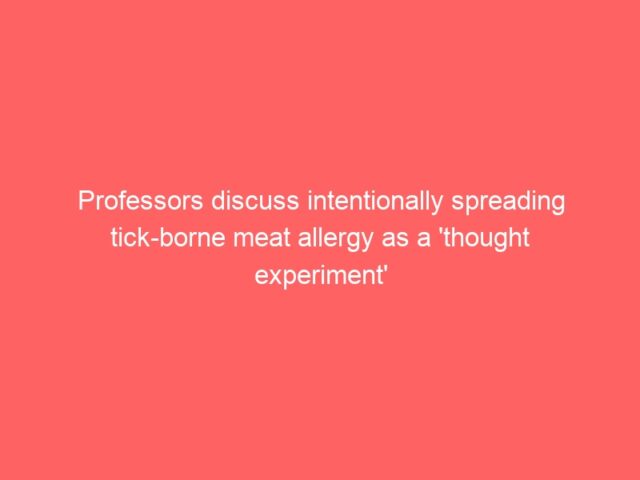In a controversial paper, two bioethics professors at Western Michigan College explored a extremely contentious query: might deliberately spreading a debilitating meat allergy be a morally compulsory act? Printed within the journal Bioethics, their paper, “Useful Bloodsucking,” examines the ethical implications of selling alpha-gal syndrome (AGS), a tick-borne sickness that causes a extreme allergic response to meat.
Alpha-gal syndrome is principally transmitted by the chew of the lone star tick. When the tick transmits a sugar molecule referred to as alpha-gal into an individual’s bloodstream, it might probably set off an allergic response to crimson meats equivalent to beef, pork, or lamb. Signs can vary from hives and gastrointestinal misery to life-threatening anaphylaxis. Nevertheless, the professors’ paper claims that AGS has “no vital unfavorable results on human well being (as long as one avoids consuming meat).”
The authors, Dr Parker Crutchfield and Dr Blake Hereth, current a conditional argument, stating that if consuming meat is morally unsuitable, then stopping the unfold of AGS can be morally impermissible. They argue that AGS acts as a “ethical bioenhancer” by motivating folks to cease consuming meat. Their argument posits that an motion is “strongly professional tanto compulsory” — a philosophical time period which means an act is required until outweighed by stronger ethical causes towards it — if it improves the world, doesn’t violate rights, and promotes virtuous conduct. The authors state, “if consuming meat is morally impermissible, then efforts to stop the unfold of tickborne AGS are additionally morally impermissible.”
The paper sparked a backlash on-line, with some critics decoding it as a name for the intentional unfold of the sickness. In response, Dr Crutchfield clarified that the paper is a hypothetical moral framework, not an endorsement of spreading the sickness. He advised The School Repair, “No,” when requested if the paper advocates for the intentional unfold of the sickness, and likewise talked about, “I’m not a vegetarian. I’m not even a vegan,” to handle assumptions about his private food regimen.
Critics like Dr H Sterling Burnett of the Heartland Institute argue that the paper’s premise is flawed as a result of it fails to adequately defend the declare that consuming meat is morally unsuitable. Burnett calls the argument “morally abhorrent,” saying it’s by no means proper to advertise a illness that harms folks, and he concludes that such a philosophical argument “offers philosophy and the examine of ethics a nasty identify.”
The paper connects to the bigger local weather change debate, as some researchers have linked livestock to greenhouse gasoline emissions and have advocated for decreased meat consumption. Different proposals embrace taxing meat to encourage a shift towards extra sustainable diets. This context highlights the rising public curiosity within the environmental impacts of meals decisions.
The dialogue is especially well timed as a result of the Facilities for Illness Management and Prevention stories that alpha-gal syndrome instances are on the rise in the US. That is partly because of the increasing vary of the lone star tick, which is influenced by components like local weather change and land use patterns.
What do you concentrate on this “thought experiment?” Tell us within the feedback part.













